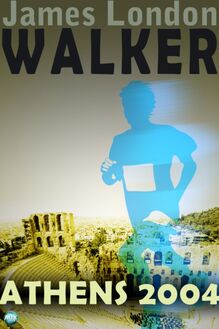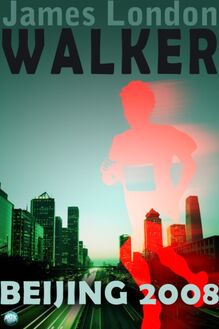Walker , livre ebook
121
pages
English
Ebooks
2014
Vous pourrez modifier la taille du texte de cet ouvrage
Obtenez un accès à la bibliothèque pour le consulter en ligne En savoir plus
Découvre YouScribe et accède à tout notre catalogue !
Découvre YouScribe et accède à tout notre catalogue !
121
pages
English
Ebooks
2014
Vous pourrez modifier la taille du texte de cet ouvrage
Obtenez un accès à la bibliothèque pour le consulter en ligne En savoir plus
Publié par
Date de parution
25 juin 2014
Nombre de lectures
0
EAN13
9781781661505
Langue
English
Title Page
WALKER: BEIJING 2008
by
James London
Publisher Information
Walker: Beijing 2008 published in 2012 by
Andrews UK Limited
www.andrewsuk.com
This book is sold subject to the condition that it shall not, by way of trade or otherwise, be lent, resold, hired out or otherwise circulated without the publisher’s prior written consent in any form of binding or cover other than that in which it is published, and without a similar condition being imposed on the subsequent purchaser.
The characters and situations in this book are entirely imaginary and bear no relation to any real person or actual happening.
Copyright © 2012 James London
The right of James London to be identified as author of this book has been asserted in accordance with section 77 and 78 of the Copyrights Designs and Patents Act 1988.
Chapter 1
It was three and a half years since Walker had vanished into thin air after winning the 2004 Olympic Marathon in Athens in a world record time of 1 hour 59 mins 30 secs. When he entered the stadium, followed by Stelios Polias, the Greek Marathon champion, 80,000 Greeks who had watched every inch of the dramatic race unfold on two enormous television screens, rose to their feet emitting a deafening roar of encouragement to their champion who, overcome by the emotion of the occasion and fatigue at having run a Marathon at a pace ten minutes faster than he’d ever run before, could not respond to Walker’s accelerating burst over the final two hundred metres. He had run side by side, elbow to elbow, with the great Olympic Champion for almost the entire race, until Walker’s sub four minute final mile which had left four great Marathon runners trailing. Breaking the two hour barrier was as significant as Roger Bannister’s first four minute mile in the 1950’s.
The Greeks had hoped for a repeat of their victory at the first modern Olympiad in Athens in 1896, when a Greek shepherd called Spirodon Louis won the gold medal in front of 100,000 Greeks. Polias’ impressive Olympic performance commemorated Pheidippides, a famous Athenian runner, who in 490BC ran barefoot from the plains of Marathon, “where the mountains look on Marathon and Marathon looks on the sea”, to carry the good news that the Persians had been routed by the fury of the Greeks, with all speed to the City Fathers of Athens. His feet cut and bleeding, he entered the city. “Rejoice, we conquer,” he cried his last gasp, and dropped dead.
Walker had led the race leaders into the reconstructed Panatheniac Stadium which dated from the time of Lycurgus in 330BC. Dating from 776BC athletes performed four yearly in honour of Zeus the supreme god of Ancient Greece. During these games wars were suspended while the athletes competed in selected events which were a run, a standing long jump, the discus, javelin, and wrestling. There were other events which included chariot racing, running in armour and boxing. From 720BC they competed in the nude. The victors were crowned with wreaths of olive leaves from the sacred olive groves of Olympia.
After midnight on that unforgettable night a tearful Archer had whispered goodbye to Walker from behind the closed window of a ground floor room in the medical centre at the British Embassy in Piraeus, where he had been taken after being pronounced dead by two Greek doctors who’d examined him fifteen minutes after collapsing over the finish line at the finish of the epic Marathon race.
Archer had re-routed the ambulance from the Athens General Hospital Morgue to the British Embassy medical centre because he suspected the Greek doctors had been misled when they examined him because of Walker’s lack of pulse and a zero heart beat.
With a heart appearing not to beat, they had both pronounced him dead. Archer knew that after any great exertion, Walker’s heart seemed to stop beating, sometimes for up to twenty minutes, before it resumed his extremely slow pulse rate.
Having honoured the ancient carrier of victorious news, Walker disappeared, the most successful Olympic athlete in history. His triumphant entrance into the ancient stadium had affected him and he had been overcome with emotion and the humility of the occasion so that not once since that night, and since his victories in the events at which he had won six gold medals and set new world records had he been seen at an athletics event.
This had mystified the sportsmen and women of the athletics world who, at every championship, in preparation for the Beijing Games, had striven to emulate his performances in Athens.
His absence had led to speculation that, although he had never tested positive for performance enhancing substances, he had taken undetectable stimulants, leading some people to think that nobody would ever get near his achievements. Athletes that disappeared from public life were often those tainted by accusations and suspicion, or guilty of drug taking. Through the Telegraph sports pages Archer ensured that Walker was never considered a cheat and his untarnished reputation remained. In prize-winning author, Ed Jedburg’s magnificent book about the Olympic Games in Athens, he placed Walker at the summit of the sport. The Victor Ludorem of the Olympic Games, alongside Jesse Owens and Michael Johnson.
To Archer it seemed longer than three and a half years. After the games, he had tidied Walker’s affairs, and spent time fighting off those clamouring for news about his whereabouts.
Nobody could forget his achievements and the world records that had accompanied his gold medal-winning performances. He had come from nowhere, with clear-cut decisive victories, to win six track and field Olympic gold medals. Athletes from the nations who considered it their God given right to be world champions were unhappy. For the USA sprint squad not to be Olympic champions, in the 100 metres and the 4 x 100 metre relay was incomprehensible to them. They regarded his wins as freak performances that would never be repeated. Until Athens the US had owned the sprints. They had been the only nation to break 39 seconds in the 4 x 100m relay. How could they lose their crown to a nation without a recognised 100-metre champion?
The secret of how Walker could run so fast, jump so far, and hurl the 2kg discus further than any man on earth, was beyond the comprehension of professional athletes who had sacrificed their lives in the pursuit of their dream, of winning an Olympic gold medal. To them, a man from nowhere, who had stolen their life’s work. No-one would accept that a man they could not meet and learn from had the right to take away the glittering prizes they had given their lives for. In Athens they had applauded him, now after he had disappeared, they despised him. They had been let down. They were angry at his refusal to share his secrets with the brotherhood of athletes, who wanted their champion to lead them too, to the Promised Land, and share what he had discovered that had so far eluded them. He had shown them the Holy Grail, but not the pathway to it, or the opportunity to share what he had with them.
With the Beijing games just a few months away, some of these athletes were still searching for the key to what Walker had shown them was possible.
In the UK, with the spectre of Athens now unused, empty, decaying Olympic stadiums already an embarrassment, the excitement caused by London’s successful bid for the 2012 games had been replaced by concern at the mounting cost of staging the games, already three times over budget with five years still to go. In track and field it was too early to see if any 2012 gold medallists would emerge. Five years in the life of an athlete was a whole career, and if in 2007 they were at their beginning of their careers they might not be around in 2012.
Jack Galloway, the Telegraph sports Editor and Archer’s boss at the time of Athens, had retired. His job had gone to Archer’s new boss, Alan Bolton, Galloway’s assistant for twenty years. Archer had been promoted to special feature sports editor, and aside from these duties he had taken over Jack’s responsibility for managing Walker’s life, including acting as a trustee for his estate. In the fifty years Jack had managed Walker, he had not been out of touch with him at any time for longer than six weeks, either personal contact, letter, telegraph, and in recent years by mobile telephone. He had provided for his wants in whichever part of the world Walker had required his assistance. In return for his devotion Walker had been a dear friend to Jack for fifty years. Advising, educating, guiding him to success in his chosen career, he had rewarded him well from his considerable wealth. This in its benefit, and some might say burden, Archer had willingly inherited.
In trying to rescue World Athletics from the plague of drug taking he had exposed himself to scrutiny, which he didn’t want, neither could he handle, so he opted out of the society he had become a part of for one year.
He had called Archer from South America a few weeks before saying that he would return to Yorkshire in 2008 once the pre-Olympic athletics season was under way, when any expectation that he might re-appear would have faded, as also would any attempt to discover his whereabouts.
When he called in late February from Yorkshire announcing that he was back, Archer detected changes in him. It made him uncomfortable and reminded him that beneath a formidable exterior Walker also sometimes demonstrate the frailties of an old man.
Jack had warned him of this. You must recognise them immediately and make allowances, he had said.
So the following morning he set off to Yorkshire to see his friend for the first time since the Athens Olympics.
For a year before the start of the 2004 games in Athens, he had been Walker’s constant compani


